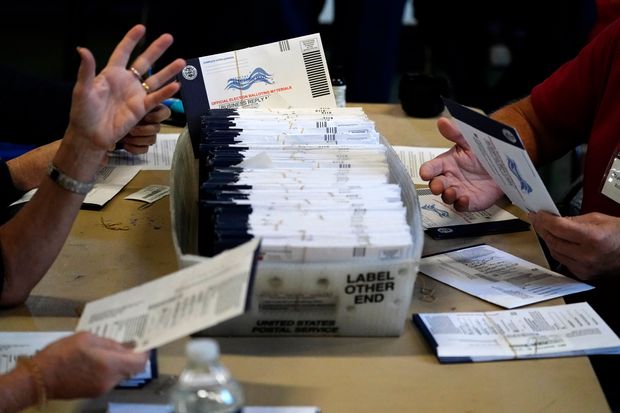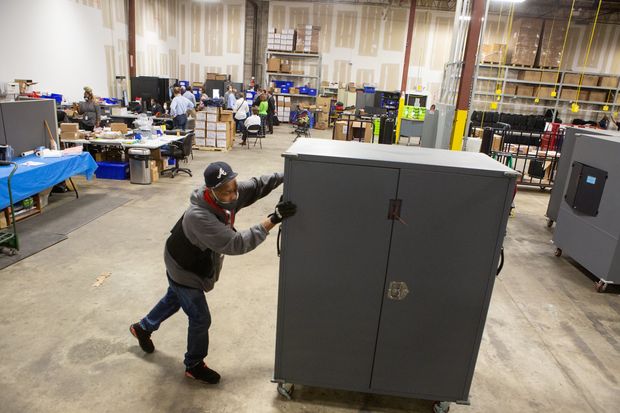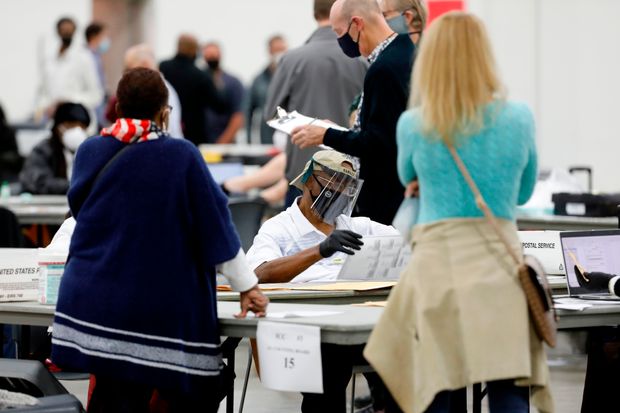Election Fraud Claims: a State-by-State Guide

Chester County election workers processed mail-in and absentee ballots in West Chester, Pa., on Nov. 4.
Photo: Matt Slocum/Associated Press
President Trump’s Republican allies in Congress are objecting to several states’ electoral votes, saying fraud and irregularities marred the November election. But there is no evidence of such problems on a scale large enough to reverse Democratic President-elect Joe Biden’s win.
Here are some of the claims about alleged irregularities in five key states and election officials’ responses. Mr. Trump’s campaign and its allies have lost dozens of lawsuits seeking to challenge the results.
Arizona
Mr. Trump and his supporters have alleged widespread irregularities in Arizona’s election. Mr. Biden won the battleground state by 10,457 votes, according to the certified result. Audits in Arizona’s four most populous counties found no evidence of widespread discrepancies, according to reports released by the Arizona secretary of state’s office.
In November, Arizona’s election was the target of claims questioning whether votes made with Sharpie pens would be counted. Government officials debunked the theory. “If you voted a regular ballot in-person, your ballot will be counted, no matter what kind of pen you used (even a Sharpie),” Arizona Secretary of State Katie Hobbs, a Democrat, said in a Facebook post.

A Fulton County employee moved voting-machine transporters in Atlanta on Nov. 4, the day after the election.
Photo: Jessica McGowan/Getty Images
Georgia
Georgia uses voting machines provided by Denver-based Dominion Voting Systems Corp. Mr. Trump said on Twitter after the Nov. 3 vote that Dominion’s equipment is “not good or secure,” and he and his allies have repeatedly questioned the accuracy of those machines.
Dominion has said such claims are baseless. There is no evidence any voting system improperly changed votes in the general election, a group of federal and state officials said in November.
Georgia Secretary of State Brad Raffensperger, a Republican, defended Dominion’s machines on a phone call with Mr. Trump, during which the president urged him to overturn the Nov. 3 election result. “We did a hand re-tally, a 100% re-tally of all the ballots and compared that to what the machine said, and it came up with virtually the same result,” Mr. Raffensperger said, according to a recording of the call reviewed by The Wall Street Journal.
Mr. Trump has also accused Georgia officials of failing to verify signatures by voters on the envelopes of absentee ballots. Georgia requires county officials to confirm that each signature is consistent with the voter’s registration file. A special audit found that Cobb County, Ga., had a 99.99% accuracy rate in correctly verifying signatures and found only two ballots with such issues, the Georgia secretary of state’s office said.

Election workers wearing masks due to the coronavirus pandemic counted absentee ballots in Detroit on Nov. 4.
Photo: jeff kowalsky/Agence France-Presse/Getty Images
Michigan
In Michigan and elsewhere, Mr. Trump’s legal team said many of the cases it filed were based on affidavits from poll watchers, voters and election officials who said they either observed or were told of misconduct on Election Day. Rudy Giuliani, the president’s personal attorney, said he had viewed hundreds of affidavits in Michigan and Pennsylvania that proved fraud, though he said he couldn’t reveal most of them because the accusers wanted to remain anonymous.
In cases where affidavits were attached to lawsuits, judges have found the documents to be speculative, inadmissible and insufficient as evidence of fraud. For example, a Michigan judge faulted the lack of specificity in sworn affidavits and dismissed allegations as “generalized speculation.”
Pennsylvania
Sen. Josh Hawley (R., Mo.) and some other Republicans have questioned the validity of a 2019 state law called Act 77, which granted every Pennsylvania voter the option to request and cast a mail ballot, along with other changes. Pennsylvania’s GOP-controlled Legislature and Democratic governor backed the law.
Mr. Hawley has said the Pennsylvania Constitution requires all votes to be cast in person, with narrowly defined exceptions. Mr. Hawley also said that the Pennsylvania Supreme Court threw out a lawsuit by U.S. Rep. Mike Kelly (R., Pa.) without hearing the merits, which he said violated its own precedent, according to an email Mr. Hawley sent to other Republican senators that was reviewed by The Wall Street Journal.
The Pennsylvania Supreme Court unanimously dismissed Mr. Kelly’s lawsuit on Nov. 28. The court’s three-page opinion observed that the congressman waited more than a year after the mail-in ballot law was enacted—and after Mr. Biden had won—to file his claim. “Millions of Pennsylvania voters had already expressed their will in both the June 2020 Primary Election and the November 2020 General Election and the final ballots in the 2020 General Election were being tallied, with the results becoming seemingly apparent,” the court said. To grant Mr. Kelly’s claim now “would result in the disenfranchisement of millions of Pennsylvania voters,” the court said.
Mr. Kelly filed an emergency application asking the U.S. Supreme Court to block Pennsylvania from certifying the election results. The court denied that request on Dec. 8. Still pending is Mr. Kelly’s appeal of the Pennsylvania Supreme Court decision; the state has until Jan. 14 to file its response to the U.S. Supreme Court. Under normal procedures, Mr. Kelly would have 14 days to file a reply brief, after which the case would be scheduled for the court’s conference, the private meeting where the justices decide which cases to hear.
Wisconsin
A Trump campaign lawsuit sought to reverse Mr. Biden’s victory and throw out four broad categories of ballots, including those cast by voters who self-certified as “indefinitely confined.” A divided Wisconsin Supreme Court rejected the lawsuit.
In a 4-3 vote, the court called the challenge to indefinitely confined voters “meritless on its face.” One justice wrote that the campaign’s attempt to throw out all ballots cast in two counties under the indefinite confinement exemption “without regard to whether any individual voter was in fact indefinitely confined has no basis in reason or law.”
The court ruled that the other challenges were brought too late. Trump lawyers could have filed them before the election, the court said.
—Deanna Paul and Jess Bravin contributed to this article.
Write to Alexa Corse at alexa.corse@wsj.com
Copyright ©2020 Dow Jones & Company, Inc. All Rights Reserved. 87990cbe856818d5eddac44c7b1cdeb8
*** This article has been archived for your research. The original version from The Wall Street Journal can be found here ***


